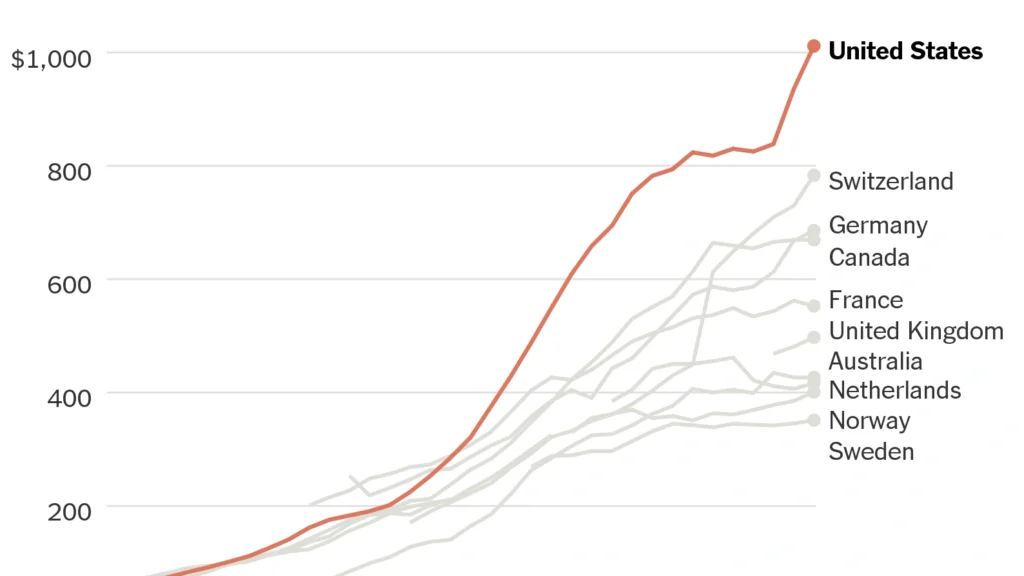The Trump administration’s decision to reverse cost caps on prescription drugs has ignited controversy nationwide. For over 120 million Americans relying on Medicare and Medicaid, this policy change is more than a headline—it’s a direct hit to their wallets and well-being.
Prescription prices are set to soar, with some medications increasing by an astonishing 4200%, disproportionately affecting the most vulnerable populations.
The Policy Reversal That Has Everyone Talking
At the heart of this controversy lies a decision to roll back cost-saving initiatives that were meant to curb the rising prices of prescription drugs, particularly insulin.
During the Biden administration, a crucial move was made to cap the cost of insulin at $35 per month.
This initiative was hailed as a much-needed relief for millions of Americans who had to choose between paying for their medication and other essentials like food and housing.
However, the Trump administration’s decision to reverse these drug cost caps has sparked outrage across the country.
People who have long struggled to afford their necessary prescriptions, especially those living with chronic conditions such as diabetes, heart disease, and asthma, now face an uncertain future.
The rollback gives pharmaceutical companies and insurance providers more power to raise prices without any restrictions, making medications even more inaccessible for vulnerable groups.
The numbers are shocking—an alarming rise in the cost of medications is expected, with some drug prices predicted to increase by up to 4200%.
These price hikes will put millions of lives at risk, particularly among seniors and low-income families who rely on Medicare and Medicaid for affordable care.

How This Affects Ordinary AmericansNumbers
Behind the statistics are real people facing incredibly tough decisions about their health.
Imagine a diabetic patient who depends on insulin to survive. In the past, $35 for a vial of insulin may have been manageable, but with the price set to skyrocket, that same medication could cost hundreds of dollars.
For individuals living paycheck to paycheck or those without adequate health insurance, this cost is simply unmanageable.
Consider the plight of John, a retired war veteran from Florida. After years of managing his diabetes, John’s insulin costs were manageable under the $35 cap.
But now, with the reversal of the policy, his insulin prescription is set to jump to nearly $400 a month—a price that could wipe out his already limited income.
John isn’t just concerned about his health; he’s now forced to choose between paying for life-saving medication or making ends meet for basic necessities like rent, utilities, and food.
Then there’s Maria, a single mother in Texas with two young children suffering from asthma. Maria’s insurance plan previously allowed her to afford the inhalers and medications her children needed to breathe easier.
With the reversal of the drug caps, the cost of asthma treatments could climb to unaffordable levels, leaving Maria with a heart-wrenching decision: pay for her children’s medication or struggle to keep the roof over their heads.
These are not isolated cases—across the country, millions of individuals will face similar choices.
And as pharmaceutical companies continue to rake in profits, these hard-working Americans are left to bear the weight of an increasingly profit-driven healthcare system.
The Financial Crisis of Rising Drug Prices
The rollback of drug cost caps isn’t just a matter of higher drug prices—it’s a broader reflection of the growing crisis in the healthcare system. Americans are already facing the highest prescription drug prices in the developed world.
According to a 2021 report, Americans pay up to four times more for prescription medications than people in other industrialized nations. For many families, even basic medications have become a luxury.
The price hikes won’t just affect those with chronic conditions. They will also place a burden on anyone who needs medication, from antibiotics to blood pressure medication, often causing delays in treatment, non-compliance, and worsening health outcomes.
The financial strain of these increases will lead to higher numbers of people forgoing prescriptions, suffering from preventable complications, and increasing hospital admissions—ultimately costing the system even more in the long run.
The choice is clear: either rein in drug prices or watch healthcare costs spiral out of control, impacting the lives of millions and burdening the economy.

Ways to Fight Back Against Rising Drug Costs
While it may seem like a difficult battle to fight, there are ways to push back against these policies and make a difference for yourself and your community. Change starts with knowledge and action. Here’s what you can do:
- Contact Your Representatives: Your voice matters, and your elected officials need to hear from you. Reach out to your senators and representatives to voice your concerns about the rollback of drug cost caps. Demand they take action to ensure prescription drugs remain affordable for everyone.
- Educate Yourself and Others: Stay informed about the latest developments in healthcare policy. Understanding the issue will help you advocate more effectively. Share information with friends, family, and coworkers to build momentum for change.
- Join Grassroots Movements: Many advocacy groups and community organizations are fighting to protect healthcare access for all. Get involved with local campaigns and movements aimed at holding pharmaceutical companies accountable and pushing for policy reform.
- Support Initiatives for Healthcare Reform: Advocate for larger structural changes that could address the root causes of rising drug costs. Support Medicare for All, drug price negotiation, and other policies that aim to make healthcare more accessible and affordable.
Why Affordable Medications Matter Now More Than Ever
This policy reversal is not just a fleeting political debate—it’s a crisis that demands immediate attention. Without action, the consequences will be felt for generations.
The rise in drug prices threatens the health of millions and forces families to make impossible choices.
We cannot stand idly by while life-saving medications are priced out of reach for millions of Americans.
The time for action is now. Stand up for what’s right, advocate for affordable healthcare, and make your voice heard in the fight to keep prescription drug prices under control!







